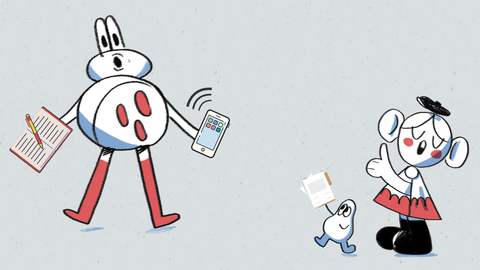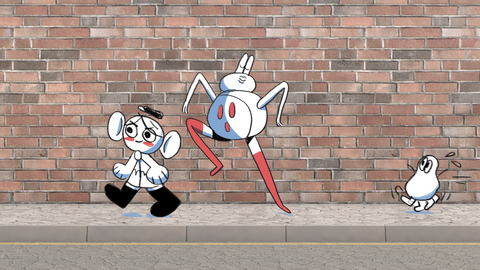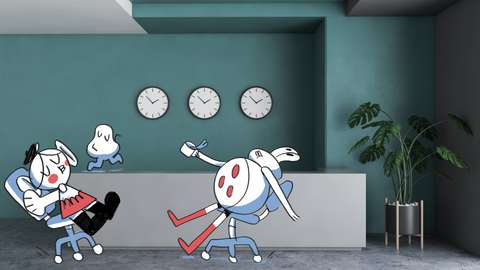There's no doubt about it; burnout sucks.
Depending on who you ask, it can feel like dragging a tonne of extra weight around with you… or it might feel more like losing your anchor and drifting away.
Sometimes, it’s like the pressure you’re under turns into noise and lights and you can’t get away from it, while other times it’s like a dull, grey day with a thick fog between you and the rest of the world.
Yep, it’s tough. And it’s common.
If you want to avoid it, there are some warning signs you can look out for. And if it does strike, there’s lots of evidence that some crucial things that can help you fight your way back to normality again.
And if you’re a manager? You’ll want to know how to protect your team from burnout and help them bounce back if it happens. Not just because it seriously affects productivity, but because that’s what great managers do.
What is burnout syndrome?
‘Burnout’ was first recognised as an occupational phenomenon by the World Health Organisation in 2019. One in five people felt unable to manage the pressure and stresses of work in the same year.
Interestingly, although it is not classified as a medical condition, 68% of people mistook symptoms of anxiety for signs of burnout, and not without good reason. It shares a lot of symptoms with both anxiety and depression, which are medical conditions. A trip to see your GP if you're worried about things is never wasted.
Key features of professional burnout syndrome include:
- Physical or emotional exhaustion, lack of energy
- Increased mental distance from your job, negativity and cynicism towards the job
- Reduced efficacy at work
Other signs of stress that you may or may not experience at the same time, or that may be a warning sign that you’re on the way to burnout, include:
- Feeling overwhelmed (or consistently underwhelmed)
- Trouble concentrating
- Intrusive thoughts
- Irritability, lack of patience
- Anxiety, fear, low self confidence
- Sleeping too much or too little
- Feeling like avoiding things or people
- Eating too much or too little
Mental Health UK identified nine contributing factors, both in the home and workplace, that increased the risk of burnout during the pandemic:
- Money worries
- Working from home
- Worries about job security
- Isolation
- Poor physical health
- Low quality or lack of sleep
- Issues with relationships
- Home-schooling children
- Caring for others
As you can see, there are lots of things that can contribute to burnout, especially at work! The Job-Demand-Resources Model gives us a useful way to think about this. It suggests that your job comes with both ‘demands’ and ‘resources’:
Demands are things that take up energy, and include:
- Workload
- Working hours
- Difficult interpersonal relationships
- Working without proper support or training
A bit of demand is necessary - in fact, it’s great for motivation! Feeling challenged and a sense of mastery over difficult tasks is great for inspiring people to reach their full potential. And it seems that even people with very demanding jobs can avoid burnout with the right resources.
In this context, resources are things that give you energy or help you to achieve more, and include:
- Training
- Adequate rest
- Flexible hours
- Mental health support
- Friendships at work
- Recognition
If the resources available to you aren’t enough to help you cope with the demands, you guessed it… burnout strikes.
How to avoid burnout
It sounds like the obvious way to avoid burnout is to make sure you’ve got plenty of ‘resources’ in your favour at work. Sure! But you only have so much control over your working conditions - and unfortunately, looking for a new job can be pretty draining too.
You need to optimise the resources:demands ratio in your daily working life and keep an eye out for the earliest signs of unbalance.
So what can you take advantage of to help you manage the challenges you face? Increase your resources! For example:
- Make time to spend with colleagues you are friends with.
- Take a proper lunch break and finish on time.
- Seek out training, tools and systems to maximise your efficiency.
- Take a short walk every hour or so to get you away from your desk and moving around (it's also really important for your health)
Try to rearrange your schedule so you have fewer meetings, or so that you can do those meetings at the time of day you usually feel the least productive in your other work.
And of course, keep an eye on the demands, too. We all experience peaks and troughs in the volume of work we have to do, but if it becomes unmanageable the sooner you can raise this (and resolve it) the better chance you have of avoiding burnout. And the good news? Avoiding burnout is good for productivity, so a sensible manager will help lighten the load before it comes to that.
Sometimes, though, burnout is unavoidable. Your life outside of work includes its own stressors; even if you have the perfect job, things can get the better of us.
How to recover from burnout
It’s very difficult to recover from burnout unless you notice that you have it! If you are feeling burnt out, you can visit your doctor. While it’s not strictly considered a ‘medical condition’, the related stress can be. Your doctor can provide support, such as referrals for talking therapies and CBT, or a note for time off work in some cases.
All of the following suggestions can help lighten the load if you’re experiencing burnout and are also great for fending it off before it happens. Of course, if the root cause is that you’re overworked and lack support, then no amount of talking, exercising or hobbies will completely resolve the issue. Make sure you address the reason as well as the symptoms.
Talk to someone at work
77% of people agreed that feeling isolated contributes to burnout.
The right person will depend on your company, but your manager, an employee representative or HR are good places to start. You might also have an employee helpline as part of your benefits bundle. But beyond that, a colleague you also consider a friend is a great place to start.
It can be really helpful to hear validation that we are indeed having a tough time and perhaps have too much on our plates. If you’re the friend that someone comes to with suspected burnout, remember to offer sympathy rather than solutions, unless specifically asked for help! It can be very tempting to dive into “Have you tried this?”. A listening ear can be just as powerful.
And if you’re a manager, make sure you’re creating a safe, trusting environment in which people feel comfortable discussing stress.
Exercise
People who regularly exercise are 30% less likely to experience depression.
Exercising is probably the last thing on your mind when you’re feeling drained already. Lots of evidence suggests that it’s the perfect antidote to low mood, lack of energy and many of the other signs of burnout. But how to get started?
The trick is to start small. And enjoyable! Frame it as ‘movement’ rather than exercise. Some different ways to move that don’t involve going to gym (or even breaking a sweat, in some cases) include:
- Taking a short daily walk; bonus points if you do it with nature around you.
- A gentle swimming session.
- Yoga, pilates or even just taking some time to stretch each morning.
- Dancing (around your living room will do).
- Cycle to places you might otherwise walk, take the bus or drive to.
More rigorous exercise confers more health benefits, but you can work your way up to that. And if you’ve already got a good workout routine in place, including some time spent in nature is a wonderful supplement to that (even if that means just bringing a few plants into your workout space).
Mindfulness and gratitude
Mindfulness can reduce your perceived level of stress. Gratitude can reduce disengagement and exhaustion.
Evidence is racking up for the benefits of ‘being present’, and of feeling and expressing gratitude. And they’re both easy to practise! Actually achieving a state of mindfulness isn’t simple, of course, but even a few minutes a day sitting quietly and noticing your feelings is powerful. The World Health Organisation offers advice and instructions for a range of simple exercises, including grounding techniques, practising awareness and noticing/naming feelings to help you get started.
Gratitude is easier to practise, although when you’re under pressure it can be challenging to think of things to be grateful for. Start small:
- Your morning cup of coffee
- A message from a friend
- Getting to sleep in at the weekend
- The funny antics of a pet
Expressing gratitude takes the practice up a notch, not only helping you to feel better but spreading that feeling - in fact, expressing work-specific gratitude can increase positive helping behaviours in your colleagues, so it’s worth a shot!
Getting better sleep
Proper sleep helps with emotional regulation, making it easier to respond to the daily stresses of life.
This is another one that sounds simple but can feel impossible if you’re burnt out. But the steps to achieve it are relatively simple, so it’s worth putting them in place even if they don’t feel like they’re working. One day, it may just fall into place. There’s tonnes written about this already, so we’ll keep it simple - try to do as many of the following as possible:
- Avoid looking at any screens an hour or so before you go to sleep.
- Sleep in a comfortable space: dark, cool and quiet are often best.
- Stick to a routine - one that allows you to get however much sleep you need.
- Practise mindfulness to help you learn how to notice and then let go of any intrusive thoughts that keep you awake.
- Set up your clothes for the morning next to your bed so you don’t have to think too much before you’ve woken up properly.
Make time for things you enjoy
Conflict between work and your ability to take part in leisure activities is positively associated with burnout and reduced wellbeing, while leisure participation is positively associated with wellbeing.
Making the most of your time outside of work is a good way to help balance the time you spend there. Seeing friends and family and taking part in hobbies does require energy, but it can also be replenishing.
And if you have truly lost enthusiasm for those things, try to modify them down to a more achievable level. For example:
- Instead of visiting family, make time to text, call or write to them.
- If you often play team sports competitively, try doing them just for fun, or just taking part in training sessions.
- If you practise solo fitness like yoga or weights, do the bits you enjoy rather than constantly pushing yourself to nail difficult poses or increase your weights.
- If you are into creative hobbies, try a fun version of your hobby. Paint by numbers instead of designing your own, or a smaller project than you’d usually take on.
- If you don’t fancy joining your usual monthly dinner with a friendship group, reach out to one or two close friends for a walk or coffee instead.
Of course, if you can find the energy to pursue these things with your usual vigour - go for it! But if not, just try to avoid pulling back too far. It’s easy to do, especially when you are tired, but maintaining some form of hobby and social life can be a real lifeline when times are tough.
The most important thing you can do if you are suffering from or at risk of burnout is to acknowledge it and take some small steps to help before it spirals. If you’re in a deeply unsupportive environment, that may mean searching for a new job. If it’s just a temporary situation though, try some of the above to help you keep your head above water until it passes.









